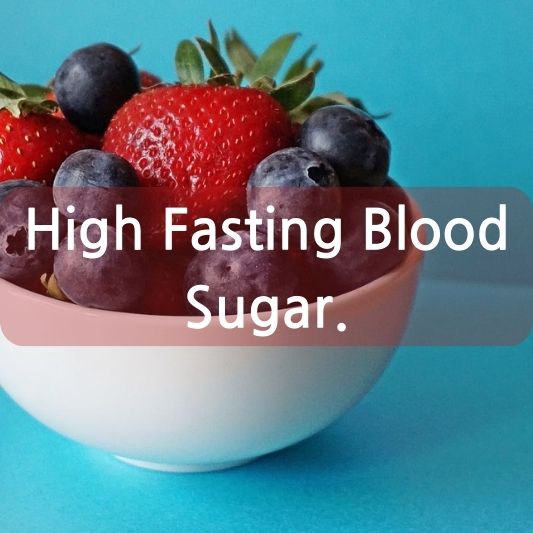Introduction to High Fasting Blood Sugar
High fasting blood sugar, medically known as hyperglycemia, refers to elevated levels of glucose in the bloodstream after a period of fasting. It’s a condition that warrants attention due to its impact on overall health and well-being.

Understanding Fasting Blood Sugar Levels
What is considered normal?
Typically, a normal fasting blood sugar level falls between 70 to 100 milligrams per deciliter (mg/dL).
Elevated levels and implications
When levels exceed the normal range, often reaching above 126 mg/dL, it indicates high fasting blood sugar. This condition can lead to various health complications if not managed effectively.
Causes of High Fasting Blood Sugar
Lifestyle factors
Unhealthy lifestyle habits, such as poor diet choices, lack of physical activity, and stress, can contribute to elevated fasting blood sugar levels.
Medical conditions
Conditions like diabetes, insulin resistance, and hormonal imbalances are primary contributors to high fasting blood sugar.
Impact on Health
Short-term effects
Immediate effects of high fasting blood sugar include fatigue, increased thirst, frequent urination, and blurred vision.
Long-term complications
Prolonged elevation of blood sugar can lead to severe complications like cardiovascular disease, nerve damage, kidney problems, and vision impairment.
Diagnosis and Monitoring
To assess fasting blood sugar levels, medical professionals perform tests like the fasting plasma glucose (FPG) test and the oral glucose tolerance test (OGTT). Regular monitoring is crucial to track changes and initiate timely interventions.
Management and Treatment Options
Lifestyle changes
Adopting a healthy diet, engaging in regular exercise, managing stress, and getting adequate sleep can significantly help in managing high fasting blood sugar.
Medications and therapies
In some cases, doctors may prescribe medications like insulin or oral hypoglycemic agents to regulate blood sugar levels.
Dietary Recommendations
Foods to avoid
Highly processed foods, sugary snacks, and excessive carbohydrates should be limited to maintain stable blood sugar levels.
Foods to include
A balanced diet comprising whole grains, lean proteins, healthy fats, and plenty of vegetables and fruits aids in controlling blood sugar.
Exercise and Its Role
Benefits of physical activity
Regular exercise improves insulin sensitivity, helps in weight management, and assists in maintaining healthy blood sugar levels.
Recommended exercises
A combination of aerobic exercises, strength training, and flexibility exercises is beneficial for managing high fasting blood sugar.
Prevention Strategies
Lifestyle modifications
Preventing high fasting blood sugar involves making sustainable lifestyle changes, including dietary adjustments and regular physical activity.
Early interventions
Early detection and proactive management of risk factors can prevent the onset of high fasting blood sugar.
Support and Resources
Various support groups, online communities, and educational resources are available to assist individuals in managing and understanding high fasting blood sugar.
Importance of Seeking Medical Advice
Consulting healthcare professionals for personalized guidance and treatment plans is crucial for effective management of high fasting blood sugar.
Myth-busting High Fasting Blood Sugar
Addressing misconceptions and myths surrounding high fasting blood sugar promotes better understanding and proactive management.
Real-life Success Stories
Exploring success stories of individuals who effectively managed high fasting blood sugar can provide inspiration and motivation.
The Psychological Aspect
Coping strategies
Managing the emotional impact of high fasting blood sugar through stress management techniques and seeking support is essential.
Mental health impact
Acknowledging the psychological effects of living with high fasting blood sugar and prioritizing mental well-being is vital for holistic health.
Conclusion: Managing High Fasting Blood Sugar Effectively
Effectively managing high fasting blood sugar involves a holistic approach that integrates lifestyle modifications, medical interventions, and emotional well-being.
FAQs About High Fasting Blood Sugar
What are the primary symptoms of high fasting blood sugar?
Fatigue, increased thirst, frequent urination, and blurred vision are common symptoms.
Can high fasting blood sugar be managed without medication?
Yes, lifestyle modifications like diet changes and regular exercise can help manage blood sugar levels.
Is high fasting blood sugar always indicative of diabetes?
Not necessarily, but it often indicates a risk of developing diabetes or other health conditions.
How often should one monitor their fasting blood sugar levels?
It’s recommended to consult a healthcare professional for personalized guidance on monitoring frequency.
Are there any natural remedies for managing high fasting blood sugar?
Some herbs and supplements may aid in managing blood sugar, but their effectiveness varies. Consultation with a healthcare provider is essential.
Find out the price of nutritional supplements to help with diabetes on iHerb!
